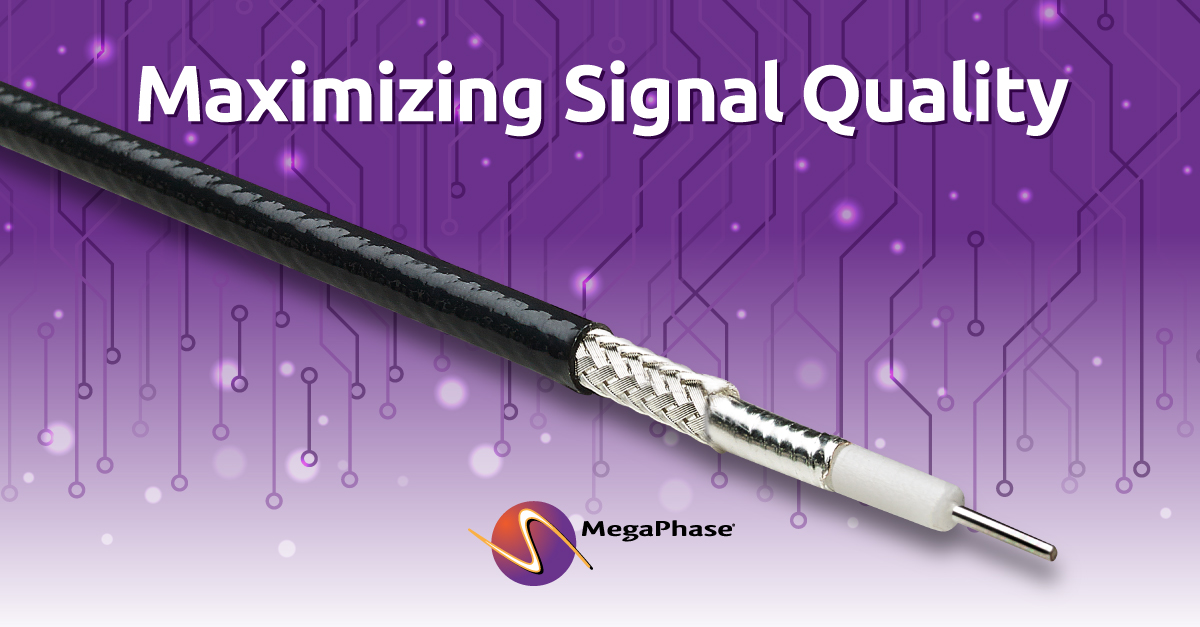In RF and microwave systems, achieving optimal signal transfer is paramount to ensure reliable and high-quality communication. Cable impedance matching plays a vital role in this process. In this article, we will delve into the importance of cable impedance matching, its impact on signal quality, and the consequences of mismatched impedance. We will also explore various impedance matching techniques, such as impedance transformers and baluns, and how they can be applied to improve signal quality in RF and microwave systems. At MegaPhase, we understand the significance of impedance matching, and our range of high-quality coaxial cables and accessories are designed to deliver exceptional performance in impedance-critical applications. MegaPhase cables are either 50- or 75-ohms.
Why is Cable Impedance Matching Crucial for Optimal Signal Transfer?
Cable impedance matching is crucial in RF and microwave systems for several reasons:
- Maximum Power Transfer:
Matching the impedance of the cable to the source and load impedances ensures maximum power transfer between components. When the cable impedance is matched, it minimizes signal reflections and maximizes the power delivered to the load, optimizing signal strength and minimizing power loss. - Signal Reflection Reduction:
Impedance mismatch between the cable and connected devices leads to signal reflections. These reflections can cause standing waves, resulting in signal distortion and decreased signal quality. By achieving impedance matching, these reflections are minimized, improving signal integrity and reducing the potential for signal degradation. - Signal Distortion Prevention:
Mismatched impedance can cause signal distortion, including amplitude variations and phase shifts. This distortion can result in errors, decreased signal-to-noise ratio, and compromised system performance. Cable impedance matching helps maintain signal integrity, preventing distortion and ensuring accurate and reliable data transmission.
Consequences of Mismatched Impedance in RF and Microwave Systems:
- Signal Reflection:
When there is a mismatched impedance between the cable and connected components, a portion of the signal is reflected back towards the source. This leads to signal reflections that can interfere with subsequent signals and degrade overall system performance. - Power Loss:
Mismatched impedance causes power loss due to reflected signals. The power that could have been efficiently transferred to the load is lost in the reflections, reducing the overall power delivered to the system. This loss can affect system sensitivity, dynamic range, and overall performance. - Signal Distortion:
Impedance mismatch can introduce signal distortion, such as amplitude variations and phase shifts. This distortion can lead to inaccuracies, data errors, and compromised signal quality. In sensitive applications, even minor distortions can have significant consequences.
Impedance Matching Techniques for Improved Signal Quality:
- Impedance Transformers:
Impedance transformers, such as transmission line transformers, can be used to match the impedance between different components. They provide a transition between two different impedance values, allowing for efficient power transfer and minimizing reflections. Impedance transformers are particularly useful when connecting devices with different impedance requirements. - Baluns:
Baluns (balanced-to-unbalanced transformers) are utilized when connecting balanced and unbalanced systems. They convert between balanced and unbalanced signals, ensuring impedance matching between the cable and the connected equipment. Baluns help reduce common-mode noise, improve signal quality, and enhance system performance. - Precision Cable Selection:
Selecting high-quality coaxial cables with the appropriate impedance rating is essential for achieving impedance matching. MegaPhase offers a range of coaxial cables with precise impedance characteristics, ensuring optimal signal transfer and minimizing reflections and signal distortion.
Cable impedance matching is vital in RF and microwave systems to achieve optimal signal transfer and maintain signal quality. Impedance mismatches can lead to signal reflections, power loss, and signal distortion, negatively impacting system performance. By utilizing impedance transformers, baluns, and coaxial cables from MegaPhase you can improve signal quality, minimize reflections, and ensure reliable communication in impedance-critical applications. Choose our RF assemblies for high-quality coaxial cables that meet your impedance-matching needs and take your RF and microwave needs to the next level.
About MegaPhase
Founded in 1998, MegaPhase is an industry leader in the design and manufacture of RF and microwave interconnect products and passive components through 110 GHz. The company offers a wide range of products serving commercial telecom and military markets, including air-, ground- and sea-based electronic warfare systems. For more information visit www.megaphase.com.



